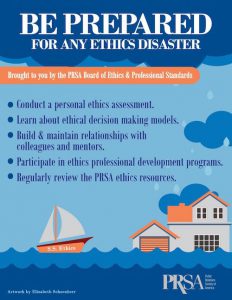
This year’s theme for PRSA’s Ethics Month is “PR Ethics Counsel: Be Prepared” and one of the ways to be prepared is to build relationships inside your company or organization so colleagues are willing to listen to your counsel when an issue arises. As a PRSA Fellow said in a confidential interview last year:
“The PR person can be the conscience, but are they listened to? Are they respected? Are they at the table? Those things are important as well because you can be doing everything right, but if nobody is listening to you, it really doesn’t matter a whole lot. Except that you can sleep at night.”
Just as a PR professional would not expect to successfully pitch a news story idea without first getting to know the reporter, we also need to get to know our colleagues in other departments including who are the key decision makers, how they prefer to get information, and what are their interests and motivations.
So how do we do this effectively? We build relationships. Yes, it can be time consuming, as it may require a few conversations at the coffee shop or a lunch appointment. But some of this groundwork also can be accomplished while working on cross-departmental projects. As a PRSA Fellow said:
“It’s part of our job anyway to understand this business and learning about their challenges they face, the issues they face, the triumphs that they experience. I think public relations has a great opportunity to do that because we can be champions for people. We can shine a bright light on the good work the different parts of an organization do… We have to take the time to do that, and then when people feel like you understand their business…then the relationship just gets stronger.”
So what are some effective ways to approach colleagues in other departments? The PRSA Fellows and Page Society members who my co-author Amy Barnes and I interviewed for our book provided a few tips.
- Show a genuine interest in who they are, their background and expertise.
- Look for things you have in common.
- Ask for advice, which demonstrates that you value their opinion.
- Be deliberate in learning about their department. Consider asking permission to attend a staff meeting to learn more.
- Educate colleagues on what public relations is and how you can assist them.
Of course, this list is not exhaustive, but the advice is similar to the steps you might take to build and maintain a friendship. And that’s the other key point — internal relationships require maintenance. That is why we list building and maintaining relationships as one of 10 everyday practices to remain prepared as an ethics counselor as well as an effective PR counselor in general.
Marlene S. Neill, Ph.D, APR, is an assistant professor at Baylor University and a member of the PRSA Board of Ethics & Professional Standards.






